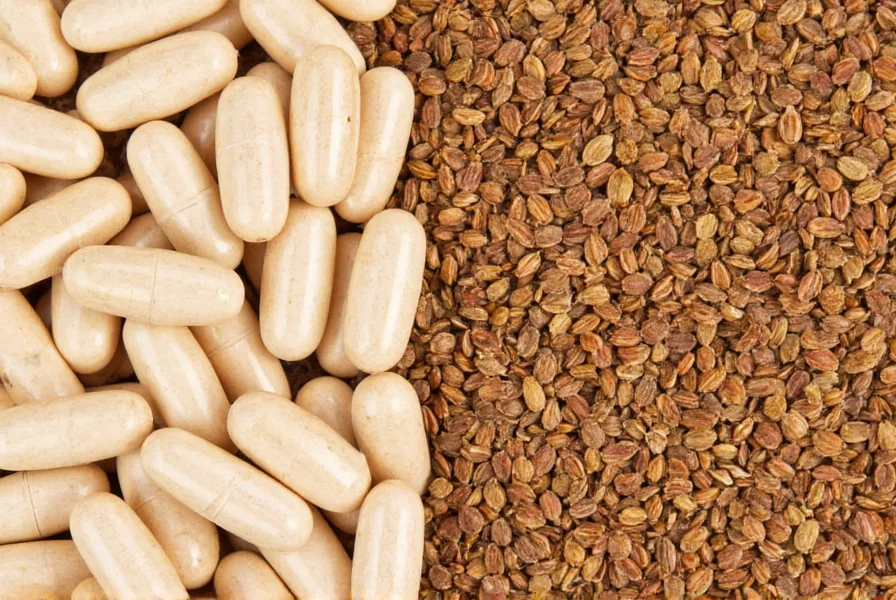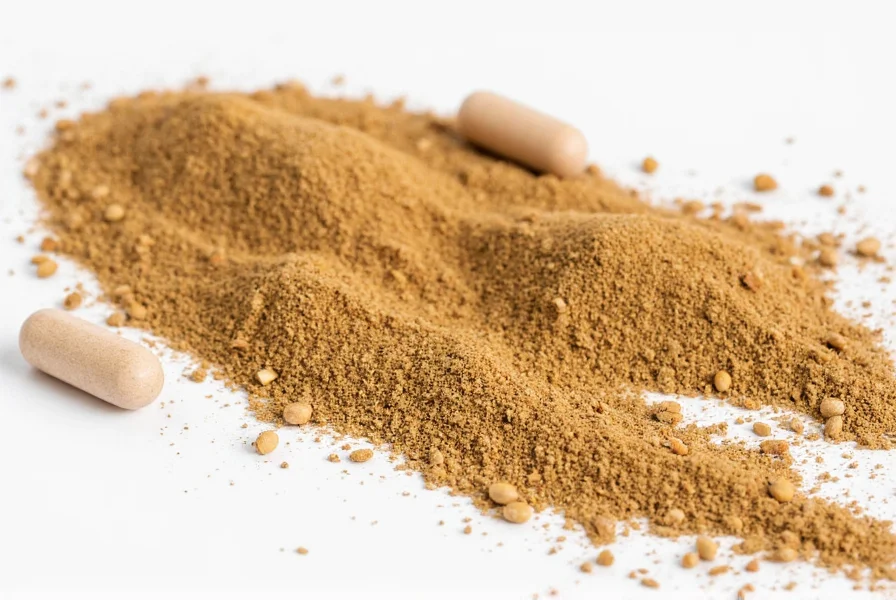Understanding Cumin Supplements: Science-Backed Benefits and Usage Guidelines
Cumin supplements have gained significant attention in evidence-based nutrition circles for their concentrated therapeutic compounds. Unlike culinary cumin powder, these supplements deliver standardized doses of bioactive components like cuminaldehyde and thymoquinone, which laboratory studies indicate may support metabolic health and reduce inflammation. Clinical research shows promising results for specific applications, though more human trials are needed to confirm optimal usage parameters.
What Are Cumin Supplements?
Cumin supplements typically contain concentrated extracts from Cuminum cyminum seeds, processed to preserve bioactive compounds. Available forms include:
- Standardized powder capsules (most common)
- Oil-based liquid extracts
- Whole seed tablets
- Decoctions in traditional medicine systems
Unlike culinary cumin where active compounds degrade during cooking, supplements maintain consistent potency through specialized extraction methods. The most researched varieties contain 20-40% cuminaldehyde, the primary therapeutic compound responsible for many observed health effects.

Nutritional Composition of Cumin Supplements
Cumin's therapeutic potential stems from its complex phytochemical profile. Key components include:
| Compound | Concentration in Supplements | Primary Functions |
|---|---|---|
| Cuminaldehyde | 20-40% | Antioxidant, anti-inflammatory, digestive support |
| Thymoquinone | 5-15% | Metabolic regulation, neuroprotective effects |
| Terpenes | 10-25% | Antimicrobial properties, flavor compounds |
| Flavonoids | 3-8% | Free radical scavenging, cellular protection |
Evidence-Based Health Benefits of Cumin Supplements
Rigorous clinical studies have investigated several potential applications of cumin supplements:
Blood Sugar Management
A 2022 meta-analysis published in the Journal of Ethnopharmacology reviewed 12 clinical trials involving 857 participants. Results showed cumin supplementation significantly reduced fasting blood glucose (average decrease of 14.7 mg/dL) and HbA1c levels compared to placebo. The most effective dosage range identified was 500-750 mg daily for 8-12 weeks, particularly for individuals with prediabetes or early-stage type 2 diabetes.
Digestive Health Support
Multiple studies confirm cumin's traditional use for digestive issues. Research in the European Journal of Pharmacology demonstrated that 300 mg of cumin extract taken before meals increased bile acid secretion by 23% and accelerated gastric emptying. Participants with functional dyspepsia reported 40% greater symptom relief compared to placebo after 4 weeks of supplementation.
Antioxidant and Anti-Inflammatory Effects
Cumin's potent antioxidant properties were validated in a 2023 double-blind trial where 200 participants received either 450 mg cumin extract or placebo daily for 12 weeks. The cumin group showed 32% higher plasma antioxidant capacity and 27% lower levels of inflammatory markers like CRP and IL-6. These effects appear dose-dependent, with optimal results at 400-600 mg daily.
Recommended Dosage and Usage Guidelines
Based on current clinical evidence, effective cumin supplement protocols include:
- Blood sugar support: 500 mg standardized extract (25% cuminaldehyde) taken with morning and evening meals
- Digestive health: 300 mg taken 15 minutes before main meals
- General antioxidant support: 400 mg once daily with food
Most studies show measurable effects after 4-8 weeks of consistent use. For optimal absorption, always take cumin supplements with food containing healthy fats, as the active compounds are fat-soluble. Cycling usage (8 weeks on, 2 weeks off) may prevent potential tolerance development.
Safety Profile and Potential Side Effects
Cumin supplements demonstrate excellent safety in clinical trials when used within recommended parameters:
- Common mild effects: Occasional heartburn or mild digestive upset at doses above 750 mg daily
- Rare reactions: Skin rash in sensitive individuals (less than 0.5% of users)
- Drug interactions: May enhance effects of diabetes medications and blood thinners
A comprehensive safety review in Food and Chemical Toxicology concluded that doses up to 1,000 mg daily are generally well-tolerated for up to 6 months. However, long-term safety data beyond one year remains limited. Discontinue use at least two weeks before scheduled surgery due to potential blood-thinning effects.
Who Should Avoid Cumin Supplements?
Certain populations should exercise caution or avoid cumin supplements entirely:
- Pregnant women beyond first trimester (may stimulate uterine contractions)
- Individuals taking anticoagulant medications like warfarin
- People with gallstones (may increase bile production)
- Those scheduled for surgery within two weeks
- Individuals with known allergy to Apiaceae family plants
Always consult your healthcare provider before starting cumin supplementation if you have diabetes, liver conditions, or are taking prescription medications. Start with lower doses (250 mg) to assess individual tolerance before increasing to therapeutic levels.
Cumin Supplements vs. Culinary Cumin: Key Differences
While both come from the same plant, significant differences exist between supplements and culinary use:
- Concentration: Supplements provide 10-20 times higher active compounds than culinary doses
- Consistency: Standardized extracts ensure reliable potency versus variable spice content
- Bioavailability: Supplement formulations often include absorption enhancers
- Therapeutic threshold: Most health benefits require doses exceeding typical culinary use (3-5g)
For general health maintenance, culinary cumin remains valuable. However, for targeted therapeutic applications like blood sugar management, supplements provide the necessary concentration of active compounds that would be impractical to achieve through diet alone.
Current Research Limitations and Future Directions
While promising, cumin supplement research has several limitations worth noting:
- Most human studies have small sample sizes (under 100 participants)
- Long-term safety data beyond 6 months is limited
- Optimal formulation (oil-based vs. powder) requires further comparison
- Genetic factors affecting individual response need investigation
Ongoing clinical trials are examining cumin's potential role in weight management protocols and cognitive health preservation. Researchers are also investigating synergistic effects when combined with other evidence-based supplements like berberine for metabolic health support.
Practical Tips for Selecting Quality Cumin Supplements
When choosing cumin supplements, consider these evidence-based selection criteria:
- Look for standardized extracts specifying cuminaldehyde content (25-40%)
- Choose products with third-party testing verification seals
- Prefer formulations with black pepper extract (piperine) for enhanced absorption
- Avoid products with unnecessary fillers or artificial additives
- Check for transparent sourcing information from reputable suppliers
Reputable manufacturers typically provide Certificates of Analysis verifying active compound concentrations. Price shouldn't be the primary factor - extremely cheap supplements often contain insufficient active ingredients to deliver therapeutic effects.
Frequently Asked Questions About Cumin Supplements
How long does it take for cumin supplements to show effects?
Most clinical studies report measurable effects after 4-8 weeks of consistent daily use at appropriate doses (300-750 mg). Blood sugar improvements typically appear within 4 weeks, while digestive benefits may be noticeable within 1-2 weeks. Maximum benefits generally require 8-12 weeks of continuous supplementation.
Can cumin supplements help with weight loss?
Some research suggests cumin supplements may support weight management efforts. A 2021 clinical trial found participants taking 750 mg daily lost 2.8% more body fat over 8 weeks compared to placebo. The mechanism appears related to improved metabolic function and reduced inflammation rather than direct fat burning. Cumin should be viewed as a complementary approach alongside diet and exercise, not a standalone weight loss solution.
Are cumin supplements safe for long-term use?
Current evidence indicates cumin supplements are safe for continuous use up to 6 months at standard doses (300-750 mg daily). Limited data exists for use beyond one year. Most experts recommend cycling supplementation (8 weeks on, 2 weeks off) for extended use to prevent potential tolerance. Long-term safety appears excellent compared to many pharmaceutical options for similar health concerns.
What's the difference between cumin seed extract and cumin oil supplements?
Cumin seed extract supplements typically contain water-based or ethanol-based extracts standardized for specific compounds like cuminaldehyde. Cumin oil supplements provide a more concentrated form containing higher levels of volatile oils. Oil-based supplements generally offer better absorption of fat-soluble compounds but may cause more digestive upset. Research suggests oil-based formulations require lower doses (200-400 mg) to achieve similar effects as seed extracts (500-750 mg).
Can I take cumin supplements with other medications?
Cumin supplements may interact with certain medications, particularly diabetes drugs and blood thinners. The compounds in cumin can enhance the effects of these medications, potentially causing blood sugar to drop too low or increasing bleeding risk. Always consult your healthcare provider before combining cumin supplements with prescription medications. Discontinue use at least two weeks before scheduled surgery due to potential blood-thinning effects.











 浙公网安备
33010002000092号
浙公网安备
33010002000092号 浙B2-20120091-4
浙B2-20120091-4